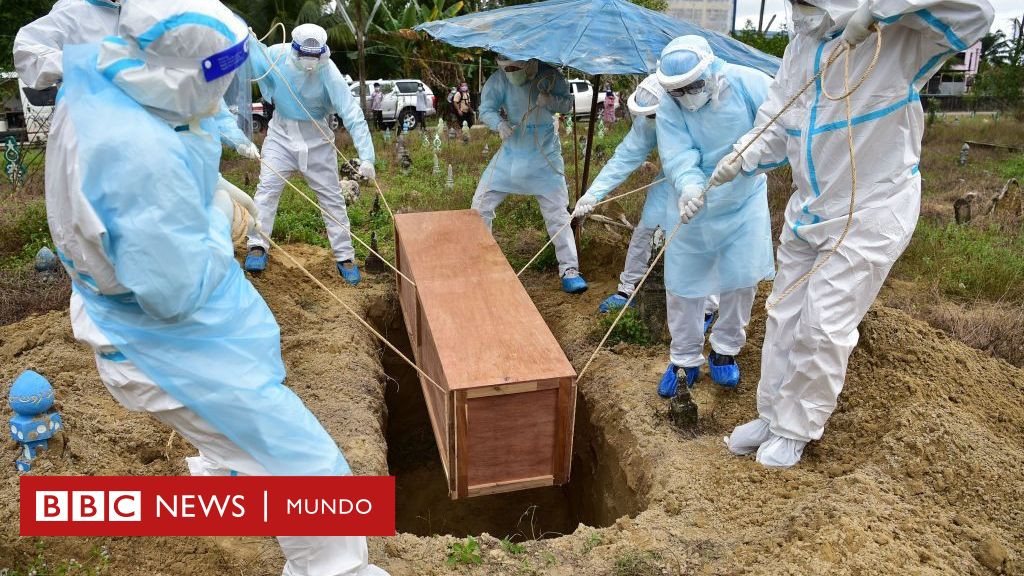image copyrightGetty Images
Caption,
The Covid pandemic killed almost 7 million people worldwide, according to the WHO.
Article information
- Author, Issariya Praithongyaem
- Role, BBC World Service
-
2 hours
How can countries better collaborate to combat future pandemics and ensure fair treatment of the poorest?
That is the question that has been going around within the World Health Organization (WHO) since the covid-19 pandemic was controlled in the world and that keeps the 194 members of the institution negotiating a new treaty to try to be better prepared.
According to Tedros Adhanom Ghebreyesus, director of the organization, a “vaccine apartheid” occurred during the coronavirus pandemic.
For him, the differences that exist on the planet became evident with the difficulties that developing countries had in accessing vital vaccines that were purchased by rich countries.
The estimate of deaths worldwide during the pandemic amounts to almost 7 million people.
What is the pandemic agreement?
The goal is for it to be a legally binding treaty, although its content and exact form have not yet been agreed upon.
For this purpose, the WHO has created an intergovernmental negotiation committee (INB) whose function is to negotiate and draft it.
The composition of the six-member committee was carefully balanced geographically, with representatives from Brazil, Egypt, Japan, the Netherlands, South Africa and Thailand leading the talks.
They have until May 27, 2024 to present an agreement to the World Health Assembly, the highest decision-making body of the WHO, which has the participation of the health ministers of its member states.
image copyrightGetty Images
Caption,
The coronavirus was first detected in China in December 2019 before spreading around the world.
The idea is that the new treaty will achieve obvious progress in relation to the binding regulations currently in force at the WHO, known as the International Health Regulations (2005), which establish the obligations of countries when there are public health events that can cross borders.
These include immediate notification to the WHO of a health emergency and the adoption of measures on trade and travel.
The Regulation was adopted following the outbreak of Severe Acute Respiratory Syndrome (SARS) between 2002 and 2003 and is still considered functional for regional epidemics such as Ebola, but inadequate for a global pandemic.
These regulations are also being reviewed as the global pandemic treaty is negotiated.
Three main points of disagreement
The draft agreement aims to offer fair and equitable access to diagnostics, vaccines, personal protective equipment and medicines.
“During the last pandemic, Africa was the last region to have access to vaccines and was at the mercy of northern countries,” said Thai Viroj Tangcharoensathien, vice president of the INB and representative of Southeast Asian countries before that committee.
According to him, the countries they identify as from the “global north” and the “global south” are divided on three key issues:
- The intellectual property and knowledge exchange necessary to manufacture vaccines and medicines.
- Financing for developing countries to prepare for and respond to pandemic outbreaks.
- Access to genetic resources and sharing of benefits associated with their use
Drug patents
Piotr Kolczynski, European Union health policy adviser for the non-governmental organization Oxfam, says talks are “stalled.”
“There is no progress due to the hardline stance of the EU and the US,” he says.
image copyrightGetty Images
Caption,
Margaret Keenan in the United Kingdom was the first person in the world to receive a clinically approved Covid-19 vaccine as part of a mass vaccination program in December 2020.
The EU and the US are home to some of the world’s largest drug manufacturers.
“They say that intellectual property is the cornerstone of innovation in the pharmaceutical industry, but they do not hesitate to take decisive measures to overcome patent barriers at a national level,” Kolczynski explained to the BBC.
As an example, he mentioned the case of Moderna, which the US government allowed to cancel practically any patent it wanted during the covid pandemic.
Meanwhile, the EU is carrying out a major review of its pharmaceutical and patent legislation.
The EU’s executive arm, the European Commission, has proposed a compulsory licensing mechanism under which it could revoke a pharmaceutical patent across the entire 27-member bloc in the event of a future pandemic, it adds.
“They recognize that intellectual property rights can be a barrier, but they oppose measures that help countries in the ‘global south’ overcome those barriers,” said Kolczynski, who also represents the People’s Vaccine Alliance, a coalition of more than 100 organizations demanding that Covid-19 vaccines, treatments and tests be freely available to everyone, everywhere.
“It is a double standard on the part of rich countries and they are being hypocritical,” he accused.
image copyrightGetty Images
Caption,
African countries struggled to access Western vaccines despite sharing data on Covid variants.
The European Commission, which negotiates the treaty on behalf of the 27 member states, says it still has “significant concerns”, although the draft text has improved in some aspects.
“We have demonstrated our commitment to our ambitious initiative of regional and local vaccine manufacturing centers in Africa for Africa, but also expanding them to South America and Asia,” a spokesperson for the agency said in a statement.
He also added that the EU and its Member States “occupy first place” as donors to the World Bank Pandemic Fund.
However, a senior source involved in the WHO talks says the lack of progress is not just due to divisions between the “global north” and the “global south.”
“China and India are also two of the main actors, but what are they? Are they from the north, the south or the east?” they ask.
“There are many Western companies that are willing to participate if their competitors, such as China, would do the same.”
China and India are part of a 29-member group called the “equity group” in the talks. Other members are Brazil, Egypt, Thailand and Indonesia.
They say the needs of developing nations must be given priority, while India has also called for the role of developed nations to be “clearly enunciated.”
Share information about pathogens
Under current rules, countries must alert the WHO and share data about a disease outbreak.
Dr Tangcharoensathien said data on pathogens and the genetic sequence of a disease are vital to making test kits and vaccines to combat it.
They are delivered “free of charge” to the “pharmaceutical industry, which benefits from it,” he adds.
Both the United Nations Convention on Biological Diversity (1992) and its Nagoya Protocol (2012) on access and benefit-sharing recognize the sovereignty of nations over genetic resources, with no legal obligation to share them, even if health emergency.
“Industries have free access to information on genetic sequences even if it is a resource of a country under the Nagoya Protocol,” Dr Tangcharoensathien explained to the BBC.
image copyrightGetty Images
Caption,
Public health systems around the world were quickly overwhelmed by the new infectious disease, for which there was no vaccine until late 2020.
However, the pharmaceutical industry’s main lobby group, the International Federation of Pharmaceutical Manufacturers Associations (IFPMA), rejects this link.
He says the immediate sharing of data on the Covid pathogen was critical to the unprecedented speed of the response, which saw an effective vaccine developed in a record time of 236 days.
“In general, conditions or negotiations linked to the exchange of pathogens can cause significant delays in the development of medical countermeasures and have consequences for public health,” he says in a statement.
The flu precedent
Dr. Tangcharoensathien stressed that rich countries should make annual financial contributions and supply anti-pandemic products to lower-income countries.
There is precedent on this point. Currently, pharmaceutical manufacturers make an annual contribution of US$28 million to WHO under Pandemic Influenza Preparedness.
The money is set aside for training and response activities during a pandemic.
image copyrightGetty Images
Caption,
Millions of people lost their jobs when the Covid pandemic forced economies to shut down.
WHO has real-time access to approximately 10% of global vaccine production, allowing it to be sent to developing countries that urgently need them.
He wants to apply the same mechanism to future pandemics, although he is pushing to go a step further.
The current draft of the agreement suggests that the WHO receive real-time access to 20% of products related to the pandemic – including diagnostics, vaccines, personal protective equipment and therapeutics – to allow equitable distribution.
“We propose 10% as a donation and 10% at affordable prices so that WHO can deliver them to lower-income countries,” Tangcharoensathien explained.
“This way, all countries – rich or poor – have access to the same vaccine at the same time.”
However, the source we had contact with involved in the talks believes that it is unlikely that rich countries will agree to “give up” on vaccines in the middle of a pandemic.
“The EU, the US and the UK believe that their politicians are not willing to say that they will commit to giving up 10%, 15% or whatever percentage,” he said.
Deal or no deal?
For people living in developing countries where healthcare is already limited, a pandemic deal is not coming fast enough.
Aggrey Aluso is the Africa director of the Pandemic Action Network, a group of 350 individuals and civil society groups campaigning for developing countries to be better prepared for infectious disease outbreaks.
“How do we get out of this status quo?” he asks.
“We have some parts of the world that have almost nothing to protect against pandemics.”
The feeling from within the WHO talks is that a deal is better than no deal, our source said.
“Maybe not everything has to be perfect on the first day, but we have to start,” he said, ensuring that everyone is convinced that a consensus must be reached in May.
“It may not be perfect, but we can move forward from there,” he emphasized.
And remember that you can receive notifications. Download the latest version of our app and activate them so you don’t miss our best content.
2024-03-01 04:50:59
#Coronavirus #tense #dispute #rich #poor #countries #vaccine #apartheid #BBC #News #World


